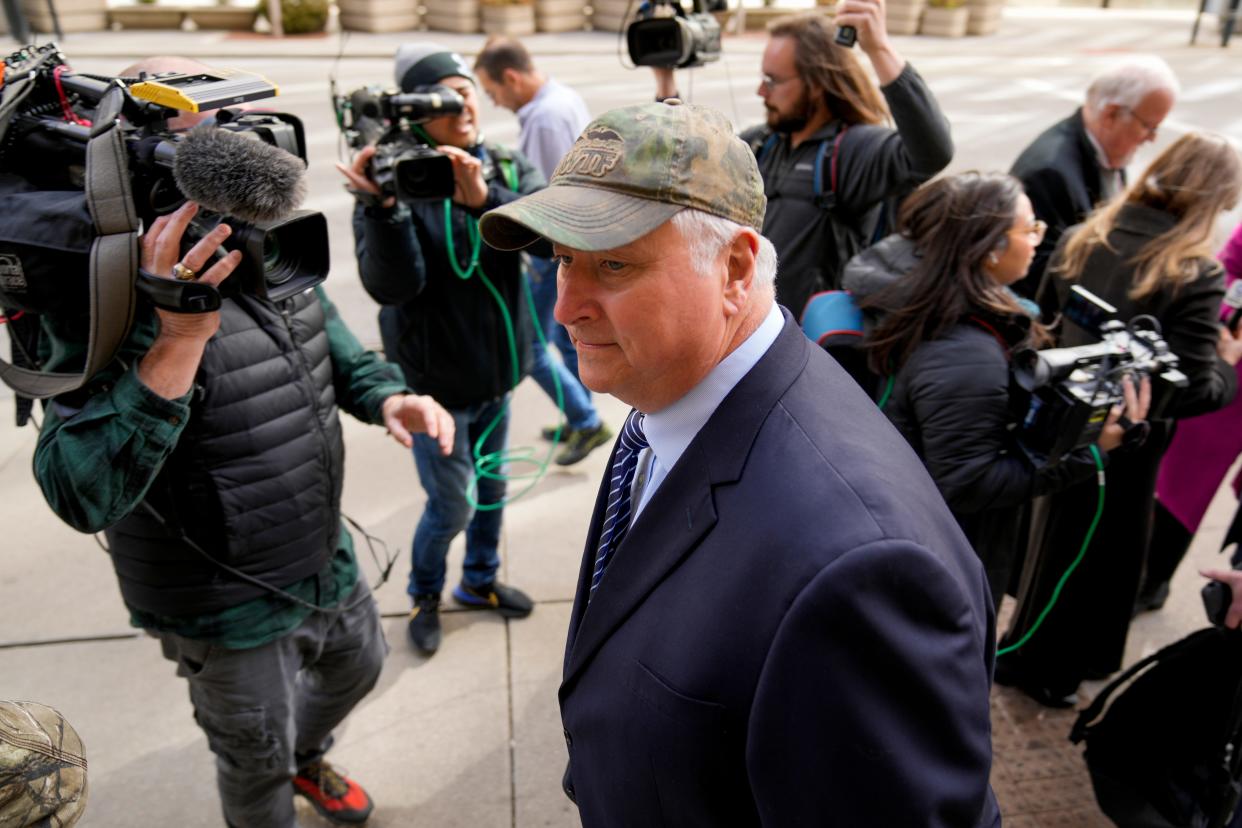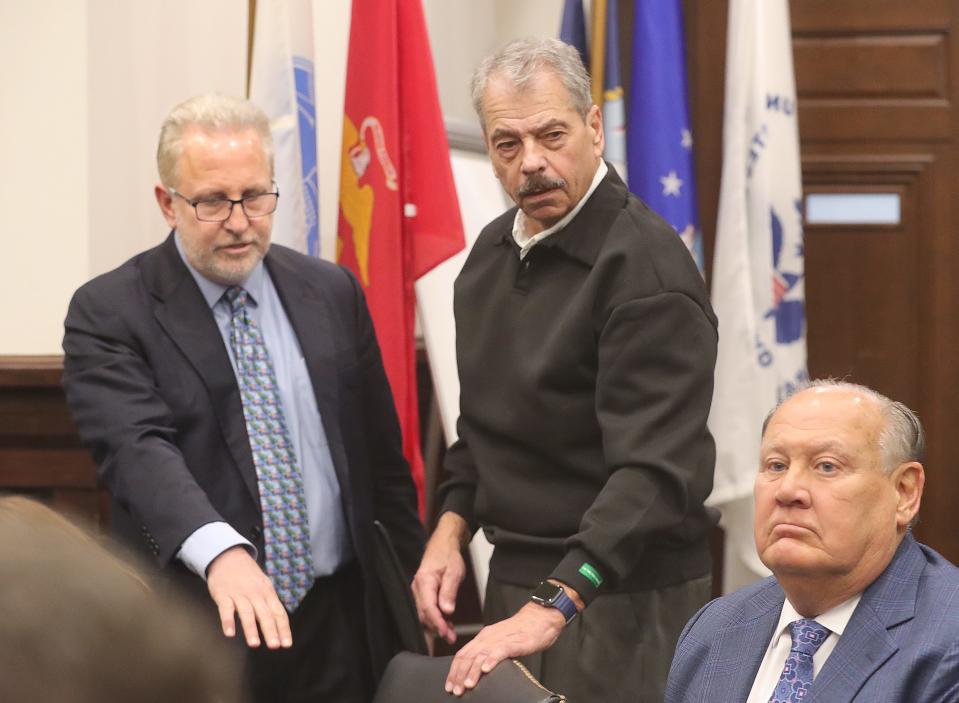Where are the ethics reforms? Ohio has done almost nothing since 2020 Householder arrest

- Oops!Something went wrong.Please try again later.
- Oops!Something went wrong.Please try again later.
- Oops!Something went wrong.Please try again later.
- Oops!Something went wrong.Please try again later.
It's been 43 long months since federal prosecutors indicted then Ohio House Speaker Larry Householder and four others in a $61 million bribery scandal involving Akron-based FirstEnergy Corp.
And it's been 11 months since a jury convicted Householder and former Ohio Republican Party Chairman Matt Borges on those charges, leading to prison sentences of 20 and 5 years respectively.
Finally, the people suspected of paying those bribes — fired FirstEnergy executives Chuck Jones and Michael Dowling — are facing charges even if they were filed by a somewhat surprising source.

Ohio Attorney General Dave Yost, a likely governor candidate in 2026, announced Monday that prosecutors had secured indictments against the former executives and Sam Randazzo, a former FirstEnergy consultant and former chairman of the Public Utilities Commission of Ohio. Federal prosecutors also indicted Randazzo in December on 11 charges largely mirroring the new state allegations.
The indictment released Monday repeatedly mentions Gov. Mike DeWine, who appointed Randazzo to PUCO, and Lt. Gov. Jon Husted, also a likely 2026 candidate, in handwritten notes and messages involving Jones and Dowling as they plotted to get Randazzo appointed and win approval of House Bill 6.
That law would have forced Ohio electric customers to pay $1.3 billion to subsidize two nuclear plants owned by a FirstEnergy subsidiary. Lawmakers reluctantly removed FirstEnergy from the payments after Householder's arrest, but it still costs ratepayers $500,000 a day to financially prop up two old power plants.
Any trial will likely again pique interest in what DeWine's administration knew about Householder's plot, although Yost's name also was mentioned during last year's trial.
The political intrigue aside, we're left to wonder why it's taken 43 months to arrive at this important moment? It's difficult to understand why federal prosecutors have never charged Jones and Dowling, although they said Monday they were still working to "pursue justice."

Randazzo and the former executives have pleaded not guilty to the new charges, with Dowling calling the indictment "irresponsible" and Jones' attorney stating he worked in the best interests of FirstEnergy and never bribed anyone.
A jury will decide their fate, but a full reading of the indictment again paints a disturbing picture of how at least one large Ohio business used millions in cash to win approval of a questionable law. It certainly seems responsible to seek justice from the people suspected of paying bribes with the same vigor as those accepting them.
While the wheels of justice turn slowly, it's also true that Ohio lawmakers have done virtually nothing since Householder's arrest cast a bright light on the corrupt manner in which the Ohio Statehouse appears to operate.
Remember one former FBI agent involved in investigating Householder described the conduct of the co-conspirators and their braggadocio as "jaw-dropping." An FBI agent described the case as "in a league of its own."
Knowing all of this, It's unconscionable to us that DeWine, Husted and lawmakers have not enacted any significant changes to Ohio's ethics laws.
What can be done? Here's a few ideas.
Whatever vetting process was used to investigate Randazzo's background was insufficient at best. A key DeWine aide knew Randazzo received $4.3 million from FirstEnergy right before DeWine nominated him. Amazingly, she failed to notify her boss. Nor were Randazzo's close ties to FirstEnergy a secret. Given PUCO's immense power to regulate telecom, natural gas, and electric companies, millions of Ohio consumers deserve to know the agency is run in the best interests of everyone, not just the companies it regulates. We urge the DeWine Administration to upgrade its vetting procedures of people appointed to the many powerful jobs in state government.
More transparency is clearly needed. Some proposed bills would force dark-money groups, the nonprofits used in Householder's conspiracy, to disclose their donors and spending. Such disclosures may have stopped Householder's allies from flooding Ohio with false advertising on HB 6. At the very least, transparency would help the public better understand messages from what currently amount to anonymous groups.
Move forward with a five-part plan introduced by state Rep. Derek Merrin, a Republican, on the eve of Householder's trial. Merrin wants to require all lobbying income to be reported and sourced directly to the clients they represent. It also would require more disclosures from PUCO nominees among other good ideas.
Establish clear and fairly low limits on gifts lawmakers and other officials may accept, while limiting coordination with dark-money groups, reforms suggested by Common Cause Ohio.
Corruption investigations are complex matters that require substantial resources to fully uncover and eventually win convictions. We're grateful for the FBI and federal prosecutors uncovering the FirstEnergy and Householder conspiracy, but it appears more resources are needed to deliver justice more quickly and consistently. It's unacceptable for 43 months to pass from the first arrest to now.
The Ohio Ethics Commission also remains largely toothless to enforce laws as it can only investigate complaints. A more proactive effort might detect issues that currently escape any detection. Merrin's bill also would allow the commission to ask Ohio's Bureau of Criminal Investigation for help investigating allegations of misconduct.
The bottom line is the public has minimal assurances that the pay-to-play culture FirstEnergy took advantage of has changed in any meaningful way.
For now, we can only hope politicians were scared by Householder's arrest and cleaned up their acts. That's not good enough. Hope is not an effective strategy.
This editorial was written by Dispatch Executive Editor Michael Shearer on behalf of the editorial board of The Columbus Dispatch. Editorials are fact-based assessments of issues of importance to the communities we serve. These are not the opinions of our reporting staff members, who strive for neutrality in their reporting.
This article originally appeared on The Columbus Dispatch: House Bill 6: Where are ethics reforms Ohio needs after new indictments?

